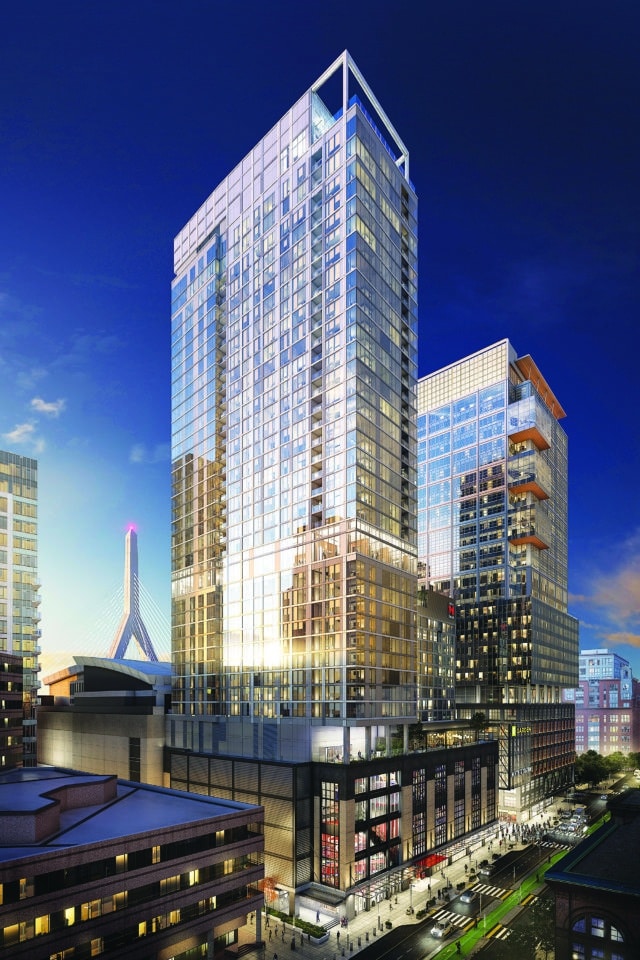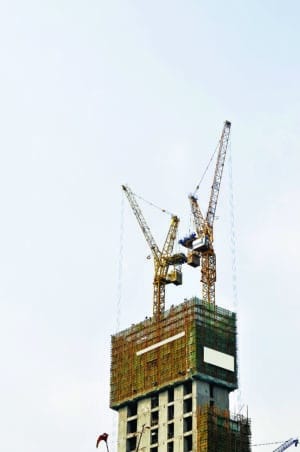Greater Boston’s position as one of the priciest rental markets in the U.S. appears secure, even as developers add more than 5,000 new apartments to the local inventory this year.
Only top-ranked New York and Silicon Valley have higher average effective monthly rents than Greater Boston’s $2,278, multifamily researchers REIS Inc. reported. Boston-area rents rose 1.7 percent in the second quarter, tied for the 11th-highest percent increase out of 79 metros tracked by the study.
The report reinforces recent statements by some of the region’s largest publicly-traded apartment owners that they’ve been able to raise rents this year because of a lull in new projects’ completion, particularly in high-priced Boston and Cambridge.
AvalonBay Communities this month reported big rent increases in its 7,201-unit Greater Boston portfolio. The Arlington, Virginia-based developer said its average rental rate on June 30 was $2,643, including concessions, up 3.5 percent year-over-year. Chief Operating Officer Sean Breslin cited a reduction in new supply by competitors.
The region’s strong post-recession economic recovery has contributed to a supply-demand imbalance, according to an Apartment List study released this month. Greater Boston has added more than 275,000 jobs between 2008 and 2018, while issuing building permits for approximately 108,000 housing units over the same period.
Boston, New York and San Diego all added more than two jobs for every multifamily unit permit issued during the study period.
“These supply-constrained markets are well known for being among the nation’s most expensive, demonstrating the fundamental relationship between supply, demand and price,” the study noted.
Housing activists also have pointed to the growth of the corporate short-stay market for driving up occupancy in new complexes, contributing to rent increases.

A temporary lull in new project completions has given Boston apartment landlords more leverage to hike rents in recent months. Competition is expected to heat up this fall with the completion of several large projects including the 440-unit Hub50House tower on Causeway Street. Image courtesy of Boston Properties
Equity Residential: More Rent Hikes Coming
Chicago-based Equity Residential, which owns more than 6,330 apartments units in Greater Boston, said average same-store rents rose 3.3 percent to $3,112 in the 12 months ending June 30. And executives said more rent hikes are on the way.
The Chicago-based multifamily REIT said a temporary lull in new supply is enabling it to hike rents at its 24 local properties, which are 96.5 percent occupied. It’s marketing units at a nearly completed project at 249 Third St. in Cambridge known as the Lofts at Kendall Square II. Studio rents start at $2,995.
Equity Residential Chief Operating Officer Michael Manelis expects some moderation later this year as several large projects open in Boston in Cambridge.
“The good news is that demand is very strong in this market, which will continue to aid the absorption of these deliveries,” Manelis said in a conference call to discuss the company’s second quarter financials.
Many of the largest projects opening this fall are high-end luxury towers, such as Boston Properties’ Hub50House at The Hub on Causeway and Miami-based Crescent Heights’ NEMA Boston in the Seaport District.
The 414-unit NEMA, which bills itself as Boston’s most technologically advanced apartment tower, lists units starting at $2,400. Greystar’s 475-unit Andi in South Bay is advertising a range of rents from $2,305 to $5,270.
Developers positioning newly completed properties in outlying Boston neighborhoods and inner suburbs as a discount alternative to downtown have reported fast lease-ups. In East Watertown, a once-gritty stretch of Arsenal Street has transformed from a building supply wholesaler to Elan Union Market, a 282-unit Greystar complex that opened in late June and is over 75 percent leased. On Western Avenue in Allston, Mount Vernon Co.’s Radius complex is over 90 percent leased with rents above $4 per square foot, after opening in June.
Investment Sales Reflect Quick Windfalls
Recent investment sales of large suburban complexes reflect rent growth translating into big payoffs off for short-term owners.
Framingham-based Taymil Partners this month sold the 148-unit Vinnin Square Apartment Homes in Salem for $52.2 million, a 45 percent return in less than four years of ownership. In announcing the acquisition, new owners Bell Partners of Greensborough, North Carolina, predicted continued strong rental growth in Greater Boston. The complex, which is being rebranded at Bell North Shore, lists one-bedrooms from $1,936.

Steve Adams
REIS Inc. is tracking a pipeline of nearly 5,500 newly constructed apartment units hitting the market in Greater Boston in 2019, representing an inventory growth rate of 2.4 percent. REIS projects another 6,300 units completed in 2020. Average rents rose 5.3 percent in 2018, according to a REIS survey of subsidized, privately managed properties with 40 or more units.
REIS Senior Economic Barbara Byrne Denham said the pace of construction will moderate but not eliminate rent increases.
“We anticipate healthy demand going forward but supply growth is expected to exceed demand growth a bit for the next two years,” she said. “Rent growth is expected to stay positive but decelerate from last year’s growth rate.”






